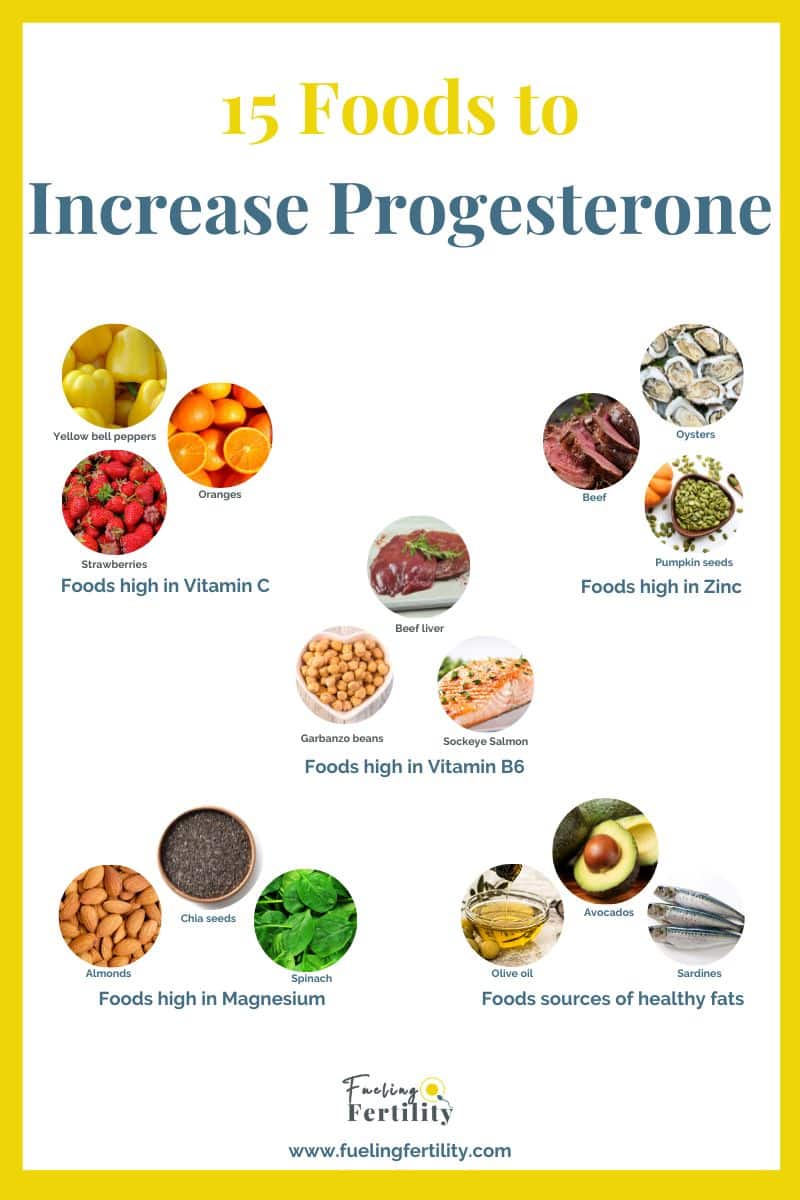Progesterone is a hormone that plays a crucial role in fertility and pregnancy. Progesterone’s main responsibility is to prepare the uterine lining, or endometrium, for implantation by thickening the walls after ovulation.
Many women struggling with infertility experience low levels of progesterone. Studies have found that increasing levels of progesterone can help women conceive and prevent miscarriages.
However, there has been research that shows certain foods can help balance progesterone levels to increase the chances of becoming pregnant.
In this article, we will learn about the signs of low progesterone, discuss the implications of low progesterone, and help you understand which foods can help increase your progesterone levels.
What Are The Signs of Low Progesterone?
Most of the time, women don’t even realize they have low progesterone, but they are exhibiting common symptoms. Some of these symptoms include: Get & Stay Pregnant With Unexplained Infertility Even If You Feel Like You’ve Tried It All!
- Hot Flashes
- Tender Breasts
- Recurrent Miscarriage
- Spotting
- Headaches
- Irregular Periods
- Low Sex Drive
- Anxiety
- Depression
- Bloating
Many women misinterpret these symptoms because they are common and often attributed to other issues. Determining if the root cause is low progesterone can help guide fertility treatments and support your journey to becoming pregnant.

Can I Get Pregnant with Low Progesterone?
While becoming pregnant with low progesterone is not impossible, there are significantly higher risks of difficulty becoming pregnant and miscarriage in women with low progesterone levels. If you’re having difficulty conceiving, checking progesterone levels can provide insight into what the issue may be and provide clarity.
How Can I Increase My Progesterone Naturally?
Women with low levels of progesterone may be experiencing symptoms such as headaches, anxiety, mood swings, and low sex drive.
Low progesterone levels can also contribute to difficulty conceiving and even miscarriages.
So how can we address low progesterone levels naturally? You can support your progesterone levels with supplements, but also with diet and lifestyle changes. There are many foods to increase progesterone, but which are the best?
Nutrients and Foods to Increase Progesterone
Research has identified several vitamins and minerals that can help support your body in producing more progesterone. (1)
- Vitamin C: Try adding fruits such as kiwis, strawberries, oranges, and vegetables including bell peppers and broccoli to support progesterone production.
In this study, supplementing with 750mg of vitamin C per day almost doubled progesterone levels and more than doubled pregnancy rates compared to the control group.
- Vitamin B6: Vitamin B6 is needed for the body to make cells and hormones including progesterone. Foods with high B6 levels include fish, beef liver, and other organ meats, potatoes, and other starchy vegetables. You can also get vitamin B6 from beef, poultry, fortified cereals, and non-citrus fruits. You can also take supplements if you’re not consuming enough from your diet, but I highly encourage having a supplement plan tailored based on your health needs and goals by a fertility dietitian to avoid taking too much or too little. (2)
- Zinc: Zinc is an important mineral for stimulating hormones that support fertility. Try adding foods like shellfish, legumes, and red meat to increase your zinc consumption.
- Magnesium: Foods high in magnesium can help regulate hormone balance. These include nuts, whole grains, and fish.
- Healthy Fats: Omega 3s and 6s are essential fats that help provide cholesterol for progesterone production. Foods such as avocados, nuts, seeds, and fish can help with progesterone production.

Other Common Questions About Foods To Increase Progesterone:
Can vitamin D increase progesterone?
Vitamin D plays a significant role in bone development and health, but it is also responsible for producing and regulating various sex hormones, including progesterone. The active form of Vitamin D has been shown to increase estrogen and progesterone levels. To increase your Vitamin D levels, spend an extra 10-20 minutes a day in direct sunlight or find foods, like cereals and orange juice, that are fortified with additional Vitamin D.
Which fruit is rich in progesterone?
Some of the best fruits to support progesterone production include:
- Kiwis,
- Bananas,
- Oranges
- Lemons.
Do almonds increase progesterone?
Almonds may increase progesterone levels due to their high content of magnesium vitamin E, and other healthy fats. that can support progesterone production. (3)
Do eggs increase progesterone?
The yolk of an egg is naturally very high in progesterone, so consuming eggs regularly can help if you are experiencing low progesterone levels.
Lifestyle Adjustments
While foods are one of the best natural approaches to treating low progesterone levels, there are several lifestyle factors that can help address the issue as well.
Try adjusting some of your lifestyle habits to support your body in healing from low progesterone:
- Manage stress: Stress causes the body to produce a different hormone, cortisol, instead of progesterone
- Stay active: Regular activity reduces stress and allows other fertility hormones to remain in balance
- Get good sleep: A regular 7-9 hours of sleep each night can help regulate hormone balance, including progesterone
Bottom Line
Low progesterone is a common, very frustrating, issue to deal with when trying to get pregnant.
It’s incredibly helpful to always test and get a baseline of where your progesterone level is, you can try an at-home progesterone testing strip like Proov Confirm PdG to understand your levels and begin working with a professional to address low progesterone levels.
If you’re struggling to conceive and have low progesterone, it’s helpful to work with a holistic team that will address the root cause of your fertility struggles and why your progesterone is low. Fueling Fertility is always here to help you along your fertility journey. Book a FREE 15-minute Fertility Strategy Call!



